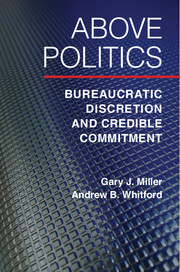Book contents
- Frontmatter
- Contents
- Preface
- Acknowledgments
- 1 Introduction
- 2 The Moral Hazard of Bureaucrats and Politicians
- 3 Political Moral Hazard and Credible Commitment
- 4 Political Moral Hazard and Bureaucratic Autonomy
- 5 “Above Politics”: The Separation of Powers and Bureaucratic Autonomy
- 6 The Control Paradox, Trust, and Leadership
- 7 Professionalism and Credible Commitment
- 8 The Politicization of Financial Regulation
- 9 The Financial Crisis and Reregulation
- 10 Conclusion: The Unraveling of Dodd-Frank
- Works Cited
- Index
- Other books in the series (Series List Continued from page ii)
8 - The Politicization of Financial Regulation
Published online by Cambridge University Press: 05 May 2016
- Frontmatter
- Contents
- Preface
- Acknowledgments
- 1 Introduction
- 2 The Moral Hazard of Bureaucrats and Politicians
- 3 Political Moral Hazard and Credible Commitment
- 4 Political Moral Hazard and Bureaucratic Autonomy
- 5 “Above Politics”: The Separation of Powers and Bureaucratic Autonomy
- 6 The Control Paradox, Trust, and Leadership
- 7 Professionalism and Credible Commitment
- 8 The Politicization of Financial Regulation
- 9 The Financial Crisis and Reregulation
- 10 Conclusion: The Unraveling of Dodd-Frank
- Works Cited
- Index
- Other books in the series (Series List Continued from page ii)
Summary
But the truth is that the United States managed to avoid major financial crises for half a century after the Pecora hearings were held and Congress enacted major banking reforms. It was only after we forgot those lessons, and dismantled effective regulation, that our financial system went back to being dangerously unstable.
– Krugman (2010, 27)PECORA'S CIRCUS
The stock market crash occurred in 1929, followed by several years of continuing economic deterioration. By 1933, the economy was in a tailspin, and the Senate Banking Committee was looking for someone to revive its lethargic investigation of the financial industry. Committee chair Peter Norbeck (R-SD) hired Ferdinand Pecora, the assistant district attorney of New York County. Michael Perino sets the scene for Pecora's activities in his excellent account, The Hellhound of Wall Street: How Ferdinand Pecora's Investigation of the Great Crash Forever Changed American Finance (Perino, 2010).
Even as Pecora prepared for his first committee hearing, the economy took a new plunge as a run on the banks led to a wave of closures. This crisis put renewed pressure on the committee to deliver both an explanation for and a solution to the problem. Pecora made news, not only for the information he gathered in the hearings he organized but also for the prosecutorial style he evinced in handling men who, during the previous decade, had been the lords of the financial universe.
Pecora made the National City Bank the first target of his hearings and its chairman, Charles “Sunshine Charley” Mitchell, his first witness. The National City Bank (now Citibank) was the second largest bank in the United States. It had grown since Mitchell had become its chairman, in large part by engaging in activities far beyond the usual commercial banking model – taking deposits from investors and making loans to businesses – and becoming deeply involved in underwriting stocks and bonds.
National City began to underwrite entire securities offerings, on the gamble that it could make a profit by selling them to investors (Hoffmann, 2001, 113). Its depositors, whose deposits were uninsured, were in effect taking the gamble as well. In carrying out this strategy, Mitchell showed a preference for high-return investments even though they also inevitably carried more risk. In 1929, Carter Glass, then a Democratic senator from Virginia, described Mitchell as being “more than any 50 men” responsible for the stock crash (Appelbaum, 2009).
- Type
- Chapter
- Information
- Above PoliticsBureaucratic Discretion and Credible Commitment, pp. 168 - 200Publisher: Cambridge University PressPrint publication year: 2016

